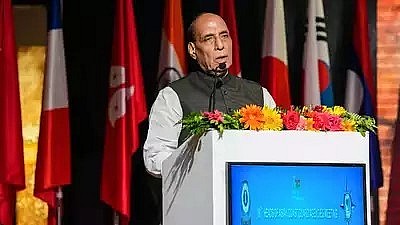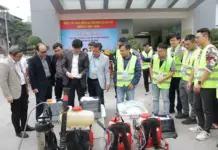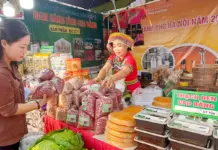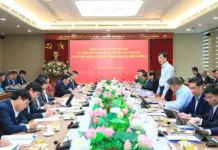 |
| “We stand for open, free, rules-based maritime borders in Indo-Pacific, in which no nation, howsoever big, may be allowed to appropriate the global common or exclude others from its fair use,” Singh said. |
Singh asserted that India, throughout history, has been a peace-loving society which has never invaded any foreign land and has always respected the territorial integrity of other countries, while treating them as equal partners.
He stressed that oceanic space should be respected as a global commons to benefit all humanity in an environmentally sustainable way.
“We stand for open, free, rules-based maritime borders in Indo-Pacific, in which no nation, howsoever big, may be allowed to appropriate the global common or exclude others from its fair use,” Singh said.
“We are always ready and forthcoming to work with all the like-minded partner countries across various forums towards this endeavour,” he added.
His comments came in the backdrop of rising concerns among leading democratic powers over China’s increasing military muscle-flexing in the Indo-Pacific.
The defence minister voiced India’s commitment to implement international regulations, enact legislation for maritime safety and security, establish cooperative mechanisms with nations and engage in capacity building of maritime law enforcement agencies.
He emphasised that India is also encouraged by the effectiveness of agreements like the Regional Cooperation Agreement for Combating Piracy and Armed Robbery Against Ships in Asia and considers mutual cooperation alone the most effective way to ensure safety and security at sea.
Singh said India’s ‘SAGAR’ (Security and Growth of All in Region) and ‘Rule Based Order at Sea’ complement its approach to inclusive growth and lasting collaboration in the region.
“With continued growth in marine traffic, the potential risk of marine pollution and requirement of search and rescue consequent to any unwanted maritime incidents have also grown manifolds,” he said.
“The recent oil spill incidents have raised concerns about the maritime environment and the attendant life hazards. Illegal Unreported and Unregulated (IUU) fishing continues to threaten long-term ocean sustainability,” Singh said.
He noted that smuggling, drug trafficking and human trafficking through ocean routes have made maritime law enforcement more challenging, emphasising that successful response strategy against such threats is the need of the hour.
Singh appreciated the role of Coast Guard Agencies in ensuring maritime safety and security.
He said that as maritime policing and law enforcement agencies, Coast Guard Agencies bring a distinctive capability and functionality to the table.
He called upon the agencies to complement the capacities of respective national navies and together ensure a safe and secure maritime environment.
Singh hoped that the maritime domain can be made conducive by ensuring a safe and secure maritime environment and cleaner seas with joint efforts.
The Indian Coast Guard is hosting the 18th Heads of Asian Coast Guard Agencies Meeting (HACGAM) in Delhi from October 14 to 18.
A total of 55 representatives from 18 countries are attending it.
Two international organisations — Regional Cooperation Agreement on Combating Piracy and Armed Robbery against Ships in Asia Information Sharing Centre (ReCAAP ISC) and UN Office on Drugs and Crime-Global Maritime Crime Programme (UNODC-GMCP) are also participating in the meeting.








